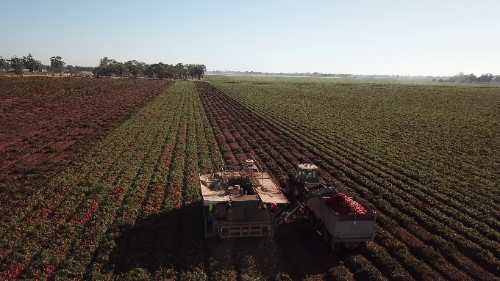Media releases
Reducing greenhouse emissions with hydrogen farm technology
Posted: Monday 29 January 2024Federation University Australia, in collaboration with the CSIRO and industry partner Foton Mobility, is undertaking research into reducing greenhouse emissions from the agriculture sector by replacing diesel powertrains in tractors with a hydrogen fuel cell-electric system.
As the transition to renewable energy gathers pace in Australia, researchers are looking at ways to incorporate hydrogen fuel cells into the powertrains of tractors and other farming equipment that has been powered by diesel for generations.
Dr Surbhi Sharma, Associate Professor of Hydrogen Technologies, highlights that the agricultural sector is the second largest contributor to Australia’s greenhouse emissions, and states many advantages of considering hydrogen fuel cells, including:
- Unlike diesel-powered equipment, the hydrogen fuel cell systems produce no emissions except water vapor.
- A continuous electric current can be generated as long as hydrogen is supplied, unlike battery-only systems.
- Removes the need for excessively heavy batteries for electrification of tractors, which can cause soil compaction.
"The farm equipment will also have a small battery similar to the current equipment, making it a fuel cell-electric hybrid. The interesting part is having no internal combustion engine," Dr Sharma said.
The project aims to collect tractor usage data from farms and utilise computational and small-scale lab testing to study the systems performance in a real-life agricultural environment, including the degradation of components under varying conditions and operation cycles. The research team will also investigate the impact of seasonal and ambient conditions on efficiency.
Apart from their weight, battery-only systems pose challenges in terms of charging requirements. Dr Surbhi Sharma emphasises that farmers cannot afford to spend 12 hours or more charging their tractors during peak seasons. The adoption of battery electric systems for agriculture would also put excessive strain on the electricity grid.
To address these challenges, Dr Sharma proposes adopting the approach (already used in fuel cell electric vehicles) of combining hydrogen and battery technologies to the agriculture sector. This approach would provide the necessary power without overburdening the grid.
Quotes attributable to Federation University Vice-Chancellor and President, Professor Duncan Bentley
"The fuel cell-electric hybrid technology we are researching at Federation University could provide real benefits to primary producers. The significant advantage with the systems is that they use hydrogen and oxygen from the air to produce electricity and water – there are no emissions except water vapour. This technology does not burn hydrogen – unlike what some people might think when they hear of hydrogen technology replacing diesel or petrol.”
"There is a lot of interest in decarbonisation and tackling climate change – and this research is just one step in society’s journey in transitioning to a net zero future.”
About Federation University Australia
With a history spanning over 150 years, Federation University Australia is Victoria’s premier regional dual-sector university with campuses located in Ballarat, Berwick, Gippsland and Wimmera. From 2018-2023 Federation ranked number one in Australia for first-generation student enrolments. In a first for Australia, the globally recognised co-operative education model will be embedded across all Federation programs from 2025.
| Contact | Megan Whytcross Corporate Communications Advisor 0484301058 m.whytcross@federation.edu.au |
|---|---|
| Images |


|